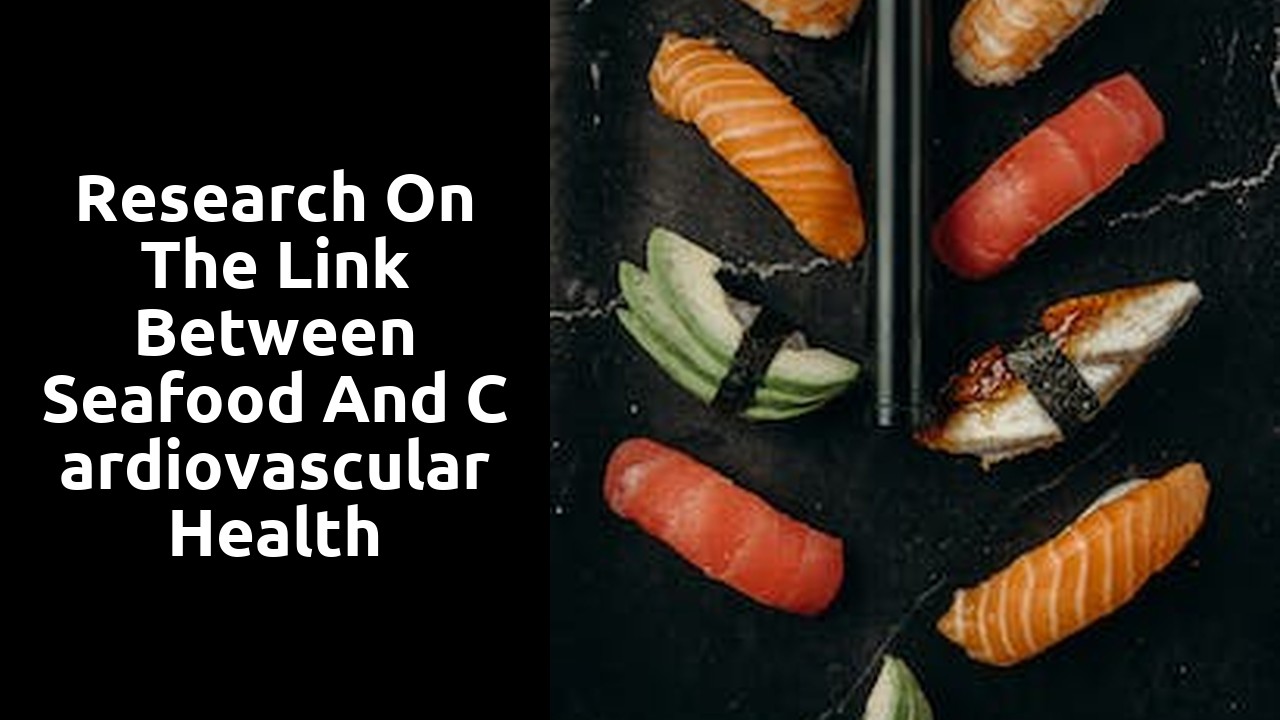Research on the Link Between Seafood and Cardiovascular Health

Unveiling the HeartHealthy Secrets of Seafood
Seafood has long been known for its delicious taste and versatility in cooking. But did you know that it also holds the secret to a healthier heart? Research has shown that consuming seafood regularly can have a positive impact on cardiovascular health.
One of the key components of seafood that benefits the heart is omega-3 fatty acids. These essential fats have been found to lower the risk of heart disease by reducing inflammation, improving blood vessel function, and decreasing triglyceride levels. Fish such as salmon, mackerel, and sardines are particularly rich in omega-3 fatty acids, making them an excellent choice for promoting heart health. In addition to omega-3 fatty acids, seafood is also a good source of protein, which plays a crucial role in maintaining heart muscle strength and overall cardiovascular function. So, by incorporating seafood into your diet, you not only satisfy your taste buds but also give your heart a nourishing boost.
Dive into the Science Behind Seafood and Cardiovascular Health
There is a wealth of scientific evidence supporting the positive relationship between seafood consumption and cardiovascular health. Multiple studies have shown that including seafood in your diet can significantly reduce the risk of developing heart disease and other cardiovascular conditions. The main reason behind this is the rich presence of omega-3 fatty acids found in seafood like fatty fish, such as salmon, mackerel, and sardines.
Omega-3 fatty acids are a type of polyunsaturated fat that has been widely recognized for its heart-healthy properties. These essential fatty acids have been shown to reduce inflammation in the body, lower blood pressure, and improve overall heart function. Additionally, omega-3 fatty acids have been found to decrease levels of triglycerides, a type of fat that contributes to the development of plaque build-up in the arteries. By including seafood in your diet, you can ensure an adequate intake of these beneficial fatty acids, promoting cardiovascular wellness and reducing the risk of heart disease.
Exploring the Relationship Between Seafood Consumption and a Healthy Heart
Seafood has long been praised for its heart-healthy benefits, and with good reason. Numerous studies have shown a positive association between seafood consumption and a healthy heart. One of the key components of seafood that promotes cardiovascular wellness is the omega-3 fatty acids it contains. Omega-3 fatty acids have been found to reduce inflammation and lower the risk of heart disease.
In addition to omega-3 fatty acids, seafood is also a rich source of other essential nutrients like vitamins D and B12, selenium, and protein. These nutrients play crucial roles in maintaining heart health and supporting overall well-being. Vitamin D, for example, helps regulate blood pressure and inflammation, while B12 aids in the production of red blood cells and the maintenance of a healthy nervous system. By including seafood in one's diet, individuals can ensure that they are getting these vital nutrients that contribute to a healthy heart.
The Surprising Benefits of Including Seafood in Your Diet for Cardiovascular Wellness
Including seafood in your diet can have surprising benefits for your cardiovascular wellness. Research has shown that consuming seafood regularly can have a positive impact on heart health. This is primarily due to the high levels of omega-3 fatty acids found in fish, such as salmon, mackerel, and tuna. These fatty acids have been found to reduce inflammation in the body, lower blood pressure, and improve overall heart function. In fact, studies have even shown that consuming just two servings of fatty fish per week can significantly reduce the risk of heart disease and stroke. So, next time you're planning your meals, consider incorporating more seafood for a happy and healthy heart.
Unraveling the Mysteries of Seafood's Impact on Heart Health
Seafood has long been revered for its potential benefits on heart health. Research has increasingly indicated that incorporating seafood into one's diet can lead to a stronger and healthier heart. But what exactly is it about seafood that makes it so beneficial? The answer lies in its rich content of omega-3 fatty acids.
Omega-3 fatty acids are a type of polyunsaturated fat that has been linked to numerous heart-healthy effects. These essential fats can help reduce inflammation in the body, lower triglyceride levels, improve blood vessel function, and decrease the risk of abnormal heart rhythms. Seafood, such as fatty fish like salmon, mackerel, and sardines, is particularly high in omega-3 fatty acids, making it an excellent choice for those looking to boost their heart health naturally. However, the precise mechanisms by which omega-3 fatty acids exert their beneficial effects on the heart are still under investigation, leaving plenty of mysteries for researchers to unravel.
Understanding the Connection Between Seafood Consumption and a Stronger Heart
When it comes to maintaining a healthy heart, the connection between seafood consumption and cardiovascular wellness cannot be ignored. Numerous studies have suggested that regularly including seafood in your diet can contribute to a stronger heart and lower the risk of heart disease. But what exactly is it about seafood that makes it so beneficial for our cardiovascular health?
One of the main reasons behind seafood's heart-healthy reputation lies in its rich omega-3 fatty acid content. Omega-3 fatty acids, particularly eicosapentaenoic acid (EPA) and docosahexaenoic acid (DHA), play a crucial role in reducing inflammation, promoting healthy blood vessel function, and lowering blood pressure. These fatty acids have been found to have anti-arrhythmic effects, preventing irregular heartbeats and potentially reducing the risk of sudden cardiac events. Additionally, omega-3 fatty acids may positively influence cholesterol levels by increasing high-density lipoprotein (HDL) cholesterol, often referred to as the "good" cholesterol, and reducing levels of triglycerides, a type of fat associated with an increased risk of heart disease.
Related Links
Seafood as a Key Element in Maintaining a Healthy HeartThe Role of Seafood in Preventing Heart Disease
Seafood and Hypertension: Understanding the Connection
Seafood Consumption and Reducing the Risk of Heart Attacks
The Benefits of Eating Seafood for a Healthy Heart